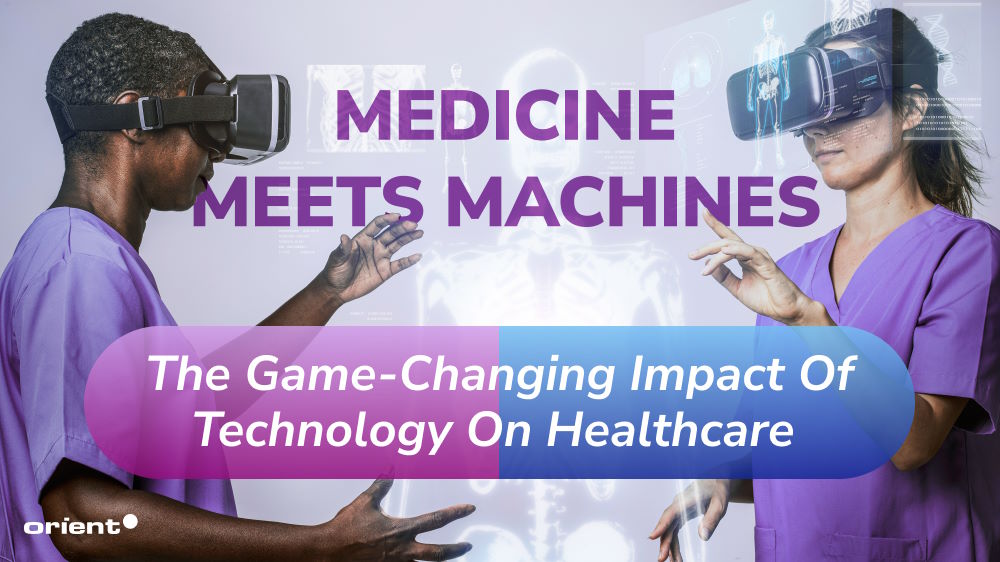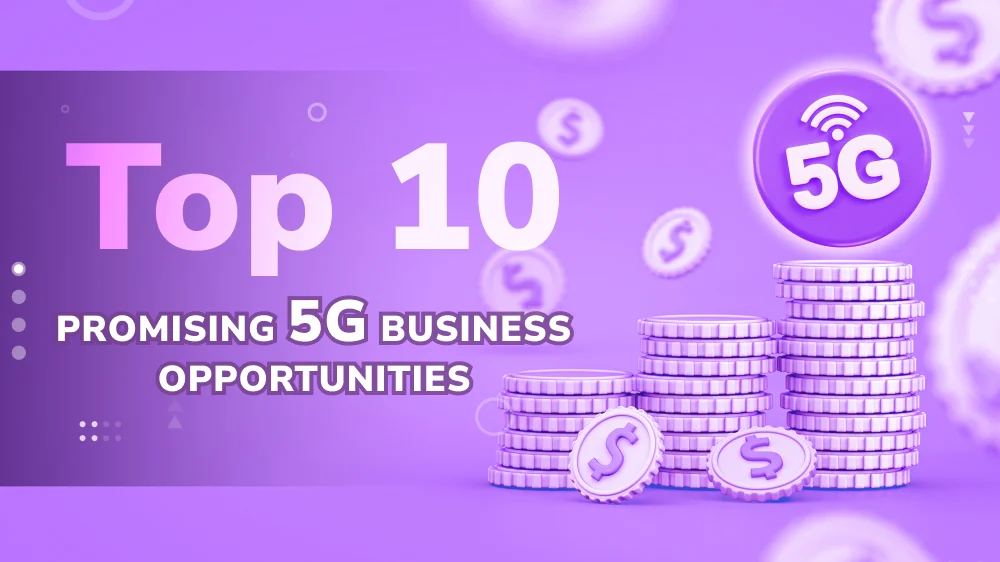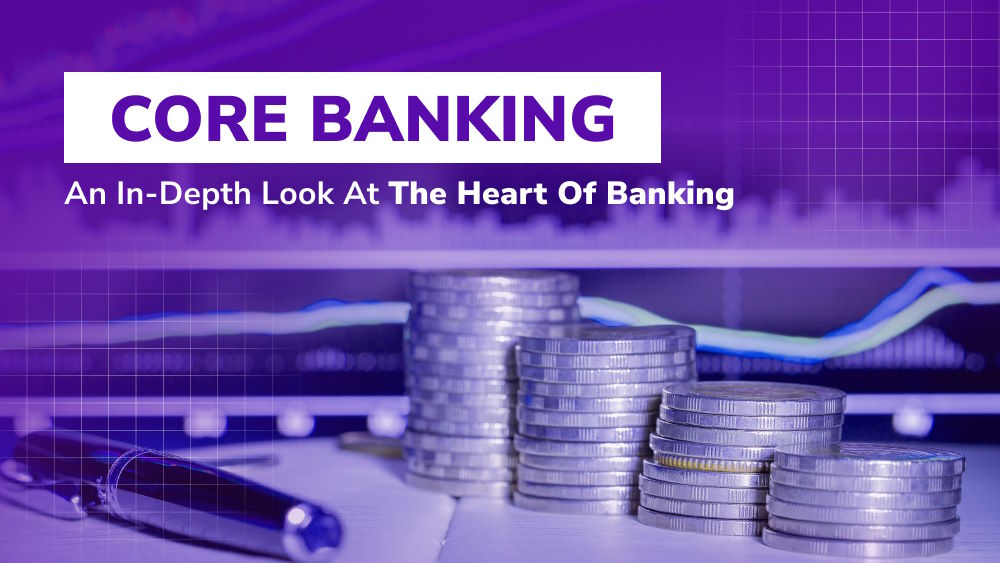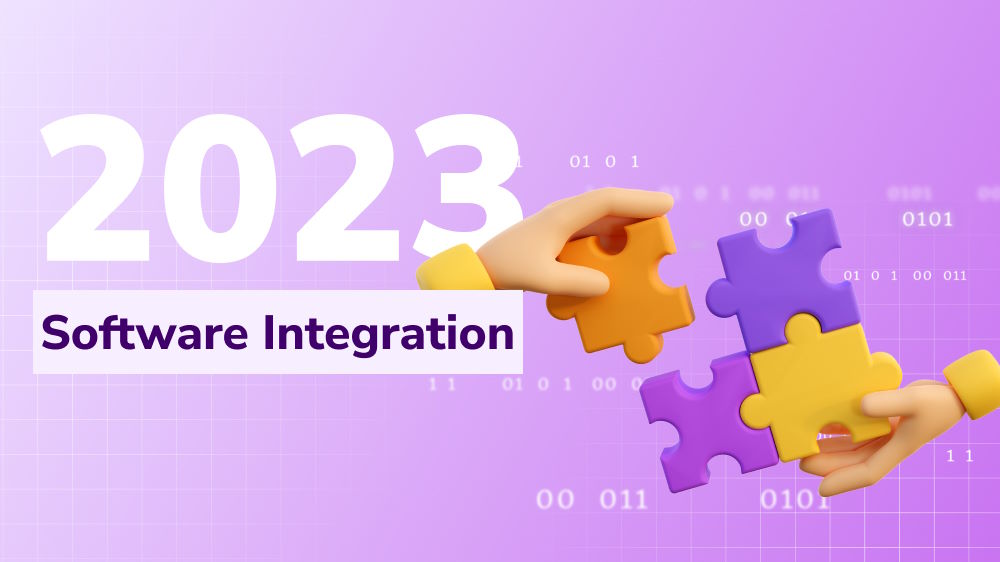Medicine Meets Machines: The Game-Changing Impact of Technology on Healthcare

Content Map
More chaptersHave you ever imagined a world where you could access quality healthcare anytime, anywhere, with just a click of a button? A world where you can monitor your health, receive personalized patient care, and receive remote diagnoses from healthcare professionals. A world where you can experience immersive and realistic simulations of medical procedures and scenarios. A world where healthcare providers can save lives and improve patient outcomes with the power of data, intelligence, and connectivity.
This is not a science fiction scenario but a reality in the healthcare industry that is becoming possible thanks to the impact of emerging technologies on healthcare. Technologies such as conversational AI, IoT, cloud computing, and robotics are transforming the way we deliver, receive, and manage healthcare, creating new opportunities and challenges for patients, healthcare organizations, and policymakers.
Let’s explore the impact of technology on healthcare, what benefits it offers, and what examples and trends we can expect in the future.
Technological Advancements in Healthcare

Technology has revolutionized the healthcare industry, ushering in a new era of possibilities and advancements. Here are some key technological breakthroughs that have transformed healthcare:
Electronic Health Records (EHR)
Electronic health records have replaced traditional paper-based records, allowing healthcare providers to store and access patient information securely. Electronic medical records systems streamline patient data management, improve accuracy, and enhance collaboration among healthcare professionals.
Telemedicine and Remote Patient Monitoring
Telemedicine has bridged the gap between patients and healthcare providers, allowing remote consultations, diagnosis, and treatment. Additionally, remote patient monitoring technologies enable continuous health tracking, empowering individuals to manage chronic conditions from the comfort of their homes.
Artificial Intelligence and Machine Learning in Diagnostics
AI and machine learning algorithms have revolutionized diagnostics by analyzing huge amounts of medical data to identify patterns and make accurate predictions. These technologies aid in early detection of diseases, improve diagnostic accuracy, and enable personalized treatment plans.
Robotics and Automation in Surgeries
Surgical procedures have been transformed by robotic-assisted technologies. Surgeons can utilize robotic systems to perform precise and minimally invasive procedures, resulting in faster recovery times, reduced complications, and improved patient outcomes.
Wearable Devices and Health Monitoring
Wearable devices, including fitness trackers and smartwatches or medication tracking software, have become ubiquitous, empowering individuals to monitor their fitness and health levels in real time. These devices track vital signs, physical activity, sleep patterns, and more, enabling proactive healthcare management.
These medical technology advancements have significantly impacted healthcare delivery, improving patient outcomes, enhancing efficiency, and transforming the way healthcare is practiced. As technology in healthcare continues to evolve, we can expect even more groundbreaking innovations that will shape the future of healthcare.
Some Outstanding Impacts of Emerging Technologies in Healthcare
Enhancing Patient Care and Treatment
In the ever-evolving landscape of healthcare, emerging technologies have become instrumental in enhancing patient care and treatment.
Improved Accuracy and Efficiency in Diagnosis
With the help of machine learning (ML) algorithms and artificial intelligence (AI), healthcare professionals can now achieve higher levels of accuracy in diagnosis. AI-powered clinical decision support systems (CDSS) have emerged as powerful tools for improving accuracy and efficiency in diagnosis, addressing the persistent challenge of medical errors.
The systems can analyze vast amounts of patient data, including medical images and electronic health records, to identify patterns and make informed assessments. This leads to more precise diagnoses, earlier detection of diseases, and improved treatment planning. Additionally, automation of certain diagnostic processes reduces the chances of human error and enhances efficiency, allowing healthcare providers to provide timely and effective care.
Remote Healthcare Access and Telemedicine Benefits
Technology has revolutionized healthcare access by enabling remote consultations and telemedicine services. Patients located in remote areas or with limited mobility can now connect with healthcare professionals through video conferencing, online platforms, or mobile applications.
Telemedicine provides convenient access to medical advice, follow-up consultations, and even remote monitoring of chronic conditions. It eliminates the need for unnecessary travel, reduces wait times, and ensures that patients receive timely care irrespective of their geographical location.
Efficient Healthcare Data Management
The care providers who implemented electronic health records and advanced data management systems have streamlined healthcare data collection, storage, and retrieval. Digital records eliminate the need for manual paperwork, reducing errors and facilitating seamless information exchange between healthcare providers.
Centralized data repositories allow for comprehensive patient profiles, ensuring that healthcare professionals have access to complete and up-to-date information when making treatment decisions. Efficient data management also facilitates medical research, population health analysis, and the development of personalized treatment plans.
Transforming Healthcare Operations
Technology’s powerful impact has not only revolutionized patient care and treatment but also reshaped the very essence of healthcare operations.
Streamlined Administrative Processes
Traditional administrative tasks in healthcare, such as patient registration, billing, and documentation, can be time-consuming and prone to errors. However, with the integration of technology, administrative processes are being streamlined.
Automation and digitization of paperwork reduce manual efforts, minimize errors, and free up valuable time for healthcare staff to focus on patient care. Digital systems for managing patient records, insurance claims, and financial transactions ensure smoother operations, faster processing, and improved accuracy in administrative tasks.
Efficient Appointment Scheduling and Management
Technology has revolutionized appointment scheduling and management, making it more convenient and efficient for both patients and healthcare providers. Online portals and mobile applications enable patients to schedule appointments, check availability, and receive automated reminders. This eliminates phone call needs and reduces the likelihood of missed appointments.
For healthcare providers, digital scheduling systems optimize the allocation of resources, minimize wait times, and offer real-time visibility into appointment schedules. This streamlined approach enhances the overall patient experience and improves operational efficiency.
Enhanced Communication and Collaboration Among Medical Professionals
Effective communication and collaboration are vital in healthcare operations, especially in multi-disciplinary care settings. Technology facilitates seamless communication and collaboration among medical professionals, leading to better coordination and improved patient outcomes.
Secure messaging platforms, video conferencing tools, and shared electronic health records enable real-time communication and information exchange, regardless of physical location. Healthcare professionals can consult, seek second opinions, and collaborate on treatment plans, resulting in more comprehensive, patient-centered care.
Ethical and Legal Considerations
As emerging technologies continue to reshape the healthcare landscape, it is crucial to address the ethical and legal considerations that accompany these advancements. From privacy and data security to regulatory compliance and equitable access, let’s delve into the key aspects that demand our attention.
Privacy and Data Security
With the increasing digitization of healthcare data and the adoption of technology-driven solutions, safeguarding patient privacy and ensuring data security are paramount. Healthcare organizations must implement robust security measures to protect sensitive patient information from data breaches or unauthorized access. Encryption, secure network infrastructure, and adherence to privacy regulations such as HIPAA (Health Insurance Portability and Accountability Act) are essential to maintain patient trust and confidentiality.
Regulatory Compliance and Patient Consent
Compliance with legal and regulatory frameworks is essential to ensure ethical practices in healthcare technology. Adhering to guidelines and regulations such as GDPR (General Data Protection Regulation) and obtaining informed patient consent for data collection, storage, and usage is crucial. Transparency in explaining how data will be used and obtaining explicit consent for any sharing or research purposes are essential ethical considerations that must be addressed.
Ethical Implications of AI and Automation in Healthcare
The increasing use of AI and automation in healthcare raises important ethical questions. Issues such as algorithm bias, accountability for AI decisions, and the potential for job displacement require careful examination. Ensuring transparency in AI algorithms, addressing bias in training data, and establishing clear guidelines for human oversight are crucial to upholding ethical standards in AI-driven healthcare.
Ensuring Equitable Access to Healthcare Technology
As technology becomes an undeniable part of healthcare, it is essential to ensure equitable access for all individuals, regardless of geographic location or socioeconomic status. Addressing the digital divide, providing training and support for underserved communities, and developing policies to bridge the gap between technological advancements and access to care are ethical imperatives.
Future Trends and Challenges
As we gaze into the crystal ball of healthcare, envisioning the future, several trends and challenges emerge.
Virtual Reality and Augmented Reality in Healthcare
The integration of virtual reality (VR) and augmented reality (AR) technologies holds immense potential in healthcare. VR can create immersive environments for medical training, pain management, and rehabilitation. AR overlays digital information in the real world, aiding in surgical procedures, anatomical visualization, and telemedicine. However, the successful implementation of VR and AR in healthcare requires addressing challenges such as usability, content creation, and ensuring regulatory compliance.
Internet of Medical Things (IoMT)
The Internet of Medical Things (IoMT) is enabling the seamless connectivity of medical devices, wearables, and sensors, promising to revolutionize patient monitoring and healthcare delivery. IoMT devices can track vital signs, collect real-time data, and transmit information to healthcare providers for analysis and intervention.
However, ensuring data security, interoperability, and standardization pose significant challenges in the widespread adoption of IoMT. Additionally, managing the massive influx of data generated by connected devices requires robust infrastructure and analytics capabilities.
Implementation and Integration Challenges
One of the key challenges in adopting emerging technologies in healthcare is the successful implementation and integration into existing systems. Healthcare organizations must navigate compatibility issues, data migration, and workflow adjustments when incorporating new technologies. Collaboration between technology providers and healthcare professionals is crucial to ensure seamless integration and optimize the benefits of these innovations.
Cost Considerations and Resource Allocation
Implementing emerging technologies in healthcare often comes with a financial burden. The cost of acquiring and maintaining the necessary infrastructure, training staff, and ensuring ongoing support can be substantial. Healthcare organizations must carefully evaluate the return on investment, prioritize resource allocation, and explore sustainable funding models to overcome financial barriers.
Maintaining Human Touch and Patient-Doctor Relationship
As technology advances, there is a concern about maintaining the human touch and preserving the essential patient-doctor relationship. While technology enhances efficiency and expands access to care, it must be balanced with the need for empathetic and personalized interactions. Healthcare professionals must navigate the fine line between leveraging technology for better outcomes while ensuring that patients feel heard, understood, and valued.
The future possibilities for healthcare with emerging technologies are exciting, and they hold the potential to revolutionize the healthcare industry by making it more efficient, accessible, and patient-centric.
If you’re ready to unlock the potential of the latest technologies for your business, contact Orient Software today. Our dedicated team of experts is eager to discuss your project, offer guidance, and provide a tailored software solution that meets your unique business requirements. Let’s embark on this transformative journey together and unlock the full potential of innovative technologies for your business success.







